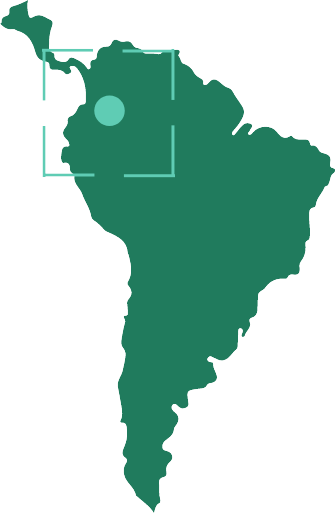Doing Business Colombia 2024
The keys to doing business in Colombia
Colombia is an investment destination in which the legal framework is linked to a robust business environment, serving as a beacon in Latin America for business development and foreign investment. With over 52 million inhabitants, Colombia is the third most populated Latin American nation and the fourth largest economy in the region.
In the last two years, the country recorded economic growth of 10.7% and 7.5% in 2021 and 2022, respectively. This economic dynamism will foreseeably remain in the next five years, outpacing other countries in the region. In the same way, the free trade agreements signed by Colombia allow access to over 60 countries and 1,500 million consumers, strengthening its position as a strategic market offering economic diversity and boosting key sectors which catalyze development and attract investment.
Colombia has cultivated an environment of innovation and entrepreneurship fostered by public policies for digital transformation, promoting investment in technology and in digital services. This approach provides a clear invitation to those seeking not only to expand, but also to thrive in sectors driven by creativity and technology.
Contents of the guide
- General introduction to Colombia
Colombian socioeconomic context. Principal imports and exports. Characteristics of the Colombian economy. Why Colombia? - Investment protection regime
Legal treatment of domestic and foreign investment. Stability agreements for the protection of investments. - Corporate
Ways to invest in Colombia. Corporate forms and their principal aspects. Representative offices and branches. Legal formalities in the incorporation of a corporate vehicle. Regulated mergers and acquisitions. - Colombian tax system
Main direct taxes of the colombian tax system. Indirect taxes. Other taxes. AX treaties for the avoidance of double taxation. Particularities of the colombian income tax system. - Labor
Employment contract. Vacation. Social benefits. Teleworking. Working hours. Transfer of workers. Termination of employment contract. Social Security contributions and employers’ mandatory social contributions. - Real estate
Public and private property. Rural and urban properties. Co-ownership. Competent entities: Notaries and Registries Supervisory Authority and the National Land Agency. Practices restricting free economic competition. Merger control regime. Unfair competition. Penalties. - Competition
Practices restricting free economic competition. Merger control regime. Unfair competition. Penalties. - Banking and securities market
Financial intermediation and regulated activities. Financial disintermediation and regulated activities. Offering of foreign financial products and services. Financial system authorities. - Fintech
Financial inclusion in Colombia and business opportunity. Fintech regulation. Open finance and Open data. Payment system. Fintech in figures in Colombia. Competent authorities. - Personal data protection rules
National register of databases. Penalties for breach of data protection rules - Infraestructure
Concession contract under the public-private parentship (PPP) scheme. Characteristics of the concession contract under the PPP scheme. Concession contract (Law 80 of 1993). Differences between public procurement processes regulated by Law 80 of 1993 and PPP processes (Law 1508 of 2012). Works contract. - Dispute resolution
Jurisdiction of the Courts. Alternative dispute resolution methods. International commercial arbitration.
Garrigues in Latin America
Our offices in Bogota, Mexico City, Santiago de Chile and Lima each have a strong and experienced legal and tax team. We offer comprehensive multidisciplinary and expert advice covering all angles of business law, advising both local clients and investors on entering and doing business in the Latin American market.
Other guides to doing business in Latin America

Contact



